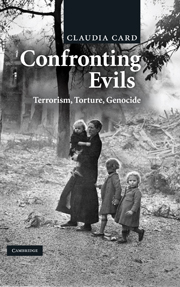Book contents
- Frontmatter
- Contents
- Preface and acknowledgements
- List of acronyms and abbreviations
- PART I The concept of evil
- PART II Terrorism, torture, genocide
- 5 Counterterrorism
- 6 Low-profile terrorism
- 7 Conscientious torture?
- 8 Ordinary torture
- 9 Genocide is social death
- 10 Genocide by forced impregnation
- Bibliography
- List of films referred to
- List of websites for international documents
- Index
8 - Ordinary torture
Published online by Cambridge University Press: 05 June 2012
- Frontmatter
- Contents
- Preface and acknowledgements
- List of acronyms and abbreviations
- PART I The concept of evil
- PART II Terrorism, torture, genocide
- 5 Counterterrorism
- 6 Low-profile terrorism
- 7 Conscientious torture?
- 8 Ordinary torture
- 9 Genocide is social death
- 10 Genocide by forced impregnation
- Bibliography
- List of films referred to
- List of websites for international documents
- Index
Summary
Twenty-two years later, I am still dangling over the ground by dislocated arms, panting, and accusing myself. (Améry 1980, p. 36)
Philosophers who reflect on torture tend to focus almost exclusively on options and choices of potential torturers and their ratifiers, to the relative neglect of the experience of the tortured. That is the approach represented in chapter 7. The focus changes in this chapter to the harm that torture does to its victims. Since torturers and ratifiers are the only free agents in the case, a focus on them might be thought ethically appropriate. Yet the experiences, positions, and agency of the tortured should not be neglected.
It is in terms of harm to victims that the claim has been made that the harsh procedures authorized for use in counterterrorism programs of the United States after 9/11 do not amount to torture. Darius Rejali calls these procedures “clean tortures” (Rejali 2007, p. xvii) since they need not leave marks (although some can and do). When it is said that a procedure is not really torture, the procedure is apt to be presented abstractly rather than considered in contexts where it is combined with other procedures and carried out repeatedly over a long time. It is apt to be presented with no mention of such conditions as continuous solitary confinement or incommunicado detention.
- Type
- Chapter
- Information
- Confronting EvilsTerrorism, Torture, Genocide, pp. 205 - 236Publisher: Cambridge University PressPrint publication year: 2010



